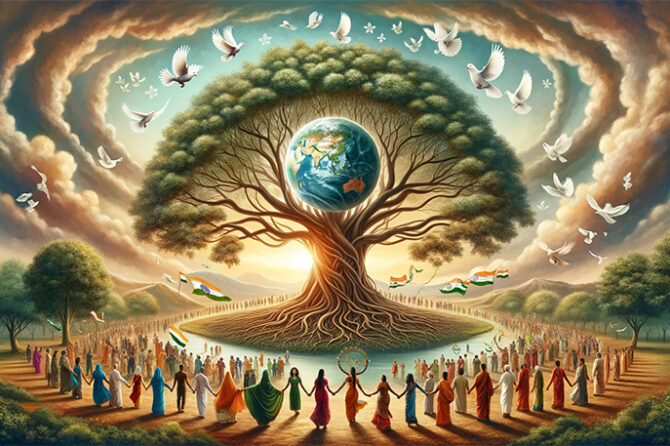
The evolution of love for one’s country from patriotism to internationalism, as envisioned by Sri Aurobindo, offers a profound perspective on how nations can contribute to global unity. This journey from patriotism to nationalism and ultimately internationalism is deeply rooted in the unique spiritual wisdom that India has to offer the world.
Patriotism to Nationalism: An Ideological Shift
Patriotism, the love for one’s country, forms the bedrock of nationalism when it aligns with a specific ideology. This shift is significant as it defines a nation’s identity and purpose. However, nationalism can often become insular if not guided by a broader vision. Sri Aurobindo’s approach to nationalism was not confined to the liberation of India alone but extended to a greater purpose – contributing to the world.
Nationalism and Internationalism: The Unique Blend
Sri Aurobindo’s nationalism was unique as it seamlessly merged with internationalism. He believed that what India could offer to the world was its timeless spiritual wisdom. This wisdom, grounded in the understanding of universal love, peace, and fulfillment, is the foundation for a meaningful life. As Sri Aurobindo said, “India is the meeting place of the religions and among these Hinduism alone is by itself a vast and complex thing, not so much a religion as a great diversified and yet subtly unified mass of spiritual thought, realization and aspiration.”
The Spiritual Perspective: Unity in Diversity
From a spiritual viewpoint, all individuals are diverse manifestations of the Divine. This understanding fosters a sense of fraternity and universal brotherhood/sisterhood. Such a perspective can lay the foundation for global unity on a psychological plane, transcending physical and cultural boundaries.
The Concept of a World Government
Sri Aurobindo’s vision extended to the idea of a World Government based on psychological unity, respecting the diversity of its constituents. This concept aligns with the ancient Indian philosophy of ‘Vasudhaiva Kutumbakam’ (the world is one family), as echoed in the Rig Veda: “Let noble thoughts come to us from every side” (Rig Ved 1.89.1). This vision was exemplified by India’s recent global initiative in sharing the COVID-19 vaccine, embodying the spirit of internationalism.
The Legacy of Openness to Ideas
Like Mahatma Gandhi, Sri Aurobindo believed in keeping the windows open to ideas from everywhere, a tradition rooted in India’s Vedic past. This openness is crucial in fostering a nationalism that embraces global unity rather than restricting it.
Quotable Quotes and Inspirational References
- “Nationalism is an infantile disease. It is the measles of mankind.” – Albert Einstein
- “The earth is but one country and mankind its citizens.” – Bahá’u’lláh
Tips for Embracing Internationalism
- Educate Yourself: Learn about different cultures and their contributions to the world.
- Promote Dialogue: Engage in conversations that bridge cultural divides.
- Practice Empathy: Understand and appreciate the perspectives of others.
- Encourage Collaboration: Participate in global initiatives that foster unity.
Conclusion: A Vision for the Future
Sri Aurobindo’s vision of Indian nationalism as a fountainhead of internationalism, based on spiritual wisdom and psychological unity, offers a path to a more harmonious and interconnected world. It’s a call to move beyond narrow confines and embrace a global perspective, recognizing that in our diversity lies our strength, and in our unity, our future.
So, let us embrace this vision, opening our minds and hearts to the world, and contribute to a global family that thrives on mutual respect, understanding, and shared wisdom. As Sri Aurobindo envisioned, let India’s spiritual heritage be the guiding light towards a world of peace, unity, and fulfillment.
Guiding Books and Articles
- “The Life Divine” by Sri Aurobindo, exploring human progress and spiritual evolution.
- “The Idea of a World Government” by Krishnaswamy Sundarji, delving into the concept of global governance.
Prof. Dr. Prahlada N. B
29 January 2024
Chitradurga.

















Prahlada Sir ,
Well said by you….
The idea of 'Vasudhaiva Kutumbakam' , meaning…' the world is one', as propounded by Philosopher Sri Aurobindo, emphasises the importance of recognising & promoting fundamental unity of the human race, transcending boundaries of nationality, ethnicity , religion & culture.
This concept of 'whole world is one' , encourages us to think of well-being of every being in the world , fostering soldarity & responsibilty, especially in addressing crucial issues like climate change, sustainable development, peace & tolerance of differences.
It is heartening to note here that at the entrance hall of our new parliament building, this sanskrit verse of our Maha Upanishad… ' Vasudhaiva Kutumbakam', is engraved…telling the whole world, that all of us belong to one family.
This concept of oneness , defines Indian culture, & in essence becomes our foreign policy, towards all other nations in the world .
Reply